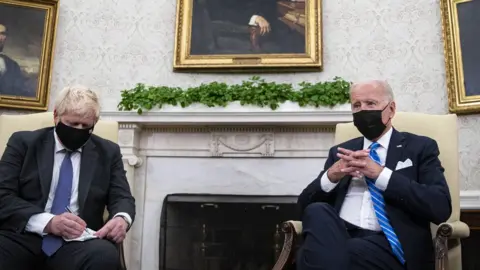US lifting ban on imports of British lamb, says Boris Johnson
The United States is lifting its decades-old ban on imports of British lamb, Boris Johnson has announced.
The PM, who is in the US for talks with UN leaders and President Joe Biden, said the ban was "unjustified".
But he admitted the UK was now focused on making "incremental steps" on US trade access, rather than aiming for a full agreement.
Mr Biden appeared to play down the chances of a wider deal during a meeting with Mr Johnson on Tuesday.
Speaking to reporters on Wednesday, Mr Johnson said the Biden administration "is not doing free trade deals around the world right now".
But he added he had "every confidence that a great deal is there to be done".
Labour's deputy leader Angela Rayner mocked the lack of movement, saying the PM had made "absolutely zero progress" on a trade deal during his US trip.
The United States has banned British lamb imports since 1989, following the first outbreaks of BSE, commonly known as mad cow disease.
A similar ban on British beef imports, imposed in 1996, was lifted in September last year.
There is no indication yet of when the US will start accepting lamb and lamb products from the UK, and an official announcement has not been made.
The US Department for Agriculture has been consulting on lifting the ban since 2016 - and there were originally hopes it would be lifted the following year.
At the time, the UK government estimated the change would be worth an extra £35m a year to the UK economy.

Analysis by Damian Grammaticas , BBC political correspondent
When it comes to trade, the big deal that's emerged from Boris Johnson's visit to Washington is that there's to be no deal happening any time soon.
That's significant, and a setback for Boris Johnson's government.
In March 2020, just a few weeks after the UK had left the EU, the then-Trade Secretary Liz Truss said the day marked a "crucial step in beginning the formal negotiations for a free-trade agreement with our largest bilateral trading partner, the United States."
Today it all looks different. The United States, Boris Johnson told us, is not doing deals.
So whilst Ms Truss predicted a "£3.4 billion lift to the economy" from a US-UK deal, today we had an "incremental step" but a tiny one by comparison - a possible opening for lamb exports.
A US deal was by far the biggest prize when it came to the promise of post-Brexit trade deals. But under this US administration, it's not happening any time soon.

Mr Johnson said the ban was "totally unjustified" and "discriminating on British farmers and British lamb".
The National Sheep Association industry group welcomed the news, adding it had always seen the US as a "potentially important market".
Its chief executive Phil Stocker cautioned, however, that "we shouldn't expect to see any sudden surge in volumes going to the US".
He added that Brexit had made it more difficult to sell into the EU - the UK's lamb largest export market - and it was "important to work on any market that gives us future potential".
 EPA
EPAMr Johnson cited the lifting of the ban as an example of "practical steps to help our exports" the UK was taking, pending progress on wider trade talks.
Downing Street has pointed to the resolution of the Airbus-Boeing trade dispute, as well as the lowering of whisky tariffs and the decision to lift the ban on British beef.
Securing a trade deal with the United States has been a priority for many Brexit-backing politicians, following the UK's departure from the EU.
But on Tuesday, Mr Biden appeared to downplay the chances of an agreement soon, adding he would discuss the issue "a little bit" with Mr Johnson during his trip to the White House.
"We're going to have to work that through," the US president added.
US deal prospects
The US is already a significant UK trading partner, accounting for £1 in every £6 of British trade.
The BBC understands the government is considering whether to join an existing trade arrangement between the US, Canada and Mexico - known as the USMCA.
However, Downing Street denies this and says it focus remains on a UK-US trade deal.
If a USMCA arrangement was pursued, it would limit the UK's ability to sell services.
Economists say the overall gains from joining it could be less than 0.1% of the UK's Gross Domestic Product (GDP) - a measurement of the size of the economy.
